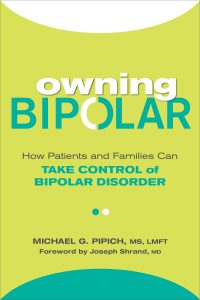Learn About Owning Bipolar

Michael’s new book, Owning Bipolar: How Patients and Families Can Take Control of Bipolar Disorder, shows you how to detect bipolar mood swings and understand differences between bipolar and other mental health problems. Complex psychological concepts are presented in a relatable, easy-to-read presentation and accented with powerful stories from people who’ve struggled with this disorder. With the help of Michael Pipich LMFT, you can become an expert in the illness of bipolar disorder while receiving supportive encouragement knowing you are not alone.
Owning Bipolar prepares you to confront denial and pursue treatments for bipolar symptoms that involve specific medications, along with various therapies for yourself and your loved ones. This book emphasizes a modern, collaborative model of care. Whether you have bipolar disorder or are a spouse, parent, or caregiver of someone with bipolar, you can become an active participant in recovery. The fear and stigma of treatment are exposed in a clear, supportive fashion. Examples of techniques adapted from Michael’s therapy practice are available for anyone to use.
Listen here to Michael's interview with Marty Lenz of KOA Radio on Owning Bipolar
Click here to view Michael's Owning Bipolar YouTube Video
What is Bipolar Disorder? Find the Answer in this New Book
Michael's book highlights the three-phase approach to bipolar therapy, which he has developed and taught to clinicians in various cities across the country. Now you can learn what to expect in each phase, to direct your own course of treatment for long-term success. Owning Bipolar: How Patients and Families Can Take Control of Bipolar Disorder published by Citadel Press, with a foreword by Dr. Joseph Shrand MD.
Click Here to Order Your Copy of Owning Bipolar Today!
Praise for Owning Bipolar...
As Michael Pipich notes, there is so much more to managing Bipolar Disorder than simply taking medication, yet too often this is the main and even only focus of care. Owning Bipolar provides an essential biopsychosocial framework for understanding, taking control and living with bipolar disorder. His book should be read by everyone involved--not only people who live with bipolar mood swings and their families and loved ones but also docs and therapists who could also learn a great deal from his wisdom, borne of immense clinical experience. I really would have appreciated having a book like this when I was in clinical practice- both to read myself and also to share with my patients.
Linda Gask, MD
Michael Pipich's Owning Bipolar is a comprehensive, inspiring, and cutting-edge guide. Michael's warm, encouraging writing style makes this book such an engaging and informative read. His therapy background has given him a deep knowledge of how bipolar can tear lives apart, and the book contains his three-phase therapeutic approach that therapists can utilize with their patients. Throughout Owning Bipolar, Michael empowers readers so they can eventually "own" bipolar—it's not only a refreshing take on this mental illness; I believe it's a missing link to effective lifelong mood stability. Chapter Nine ("Postpartum Onset in Bipolar Disorder") covers a topic usually missing in most bipolar books, and it's extremely helpful. (How I wish our family had this book after I was diagnosed with postpartum bipolar disorder!) Owning Bipolar is a remarkably helpful, unique book. It makes me feel good to know it's out in the world because I know it will help countless people affected by bipolar disorder.
Dyane Harwood, B.A.
Author, "Birth of a New Brain - Healing from Postpartum Bipolar Disorder"
Member, International Society for Bipolar Disorders, Perinatal Mental Health Advocate
Beautifully written with honesty and purpose, Owning Bipolar is a must read for anyone struggling to understand bipolar disorder. As a practicing psychiatrist for the past 20 years, I have too often seen patients and families overwhelmed, scared and confused when they first hear the diagnosis of bipolar disorder. In Owning Bipolar, Michael Pipich, LMFT has developed an essential resource which will provide clarity and understanding to a seemingly complex and confusing psychiatric condition. In reading Michael’s work, patients, families and caregivers will be guided by the central theme of not being controlled by bipolar disorder but instead, maintaining control and thriving. This book replaces isolation and apprehension with courage and hope. Ultimately, the reader gains insight that emotional stability can be achieved and happiness, creativity and control are not only possible but within reach.
David B. Weiss, MD, FAPA, Psychiatrist, Denver CO
Owning Bipolar is an excellent practical guide for bipolar patients and their families who often feel lost in the mental health system. If you're battling bipolar disorder, this book would expand your knowledge of treatment approaches, and allow you to explore the truth about your own bipolar experiences. By learning the truth from Michael and from people who are going through the similar journeys, you may set yourself free from being taken by bipolar, and move forward to the emotionally balanced, productive life you truly deserve.
Galina Mindlin, MD, PhD, Psychiatrist, Psychotherapist, Educator
Author, "Your Playlist Can Change Your Life"
My brother's bipolar condition proved to be fatal. Diagnosed at age 19 at a time when no one was talking about mental illness, my brother struggled to own his bipolar condition. While he was deeply ashamed of being "mad," he also valiantly sought treatment -- medication and talk therapy. From his initial diagnosis during his college years to his untimely death at age 34, my brother received many diagnoses and treatments. No clear path, no helpful role models existed. Ultimately, he succumbed to the incredible emotional pain and isolation his illness brought him. It breaks my heart to see how deeply his illness was misunderstood, misidentified and mistreated over the course of his young adult life.
For book publicity and speaking engagements, contact Janet Appel Public Relations, LLC at 212-258-2413 or janetappel54@aol.com



You must be logged in to post a comment.